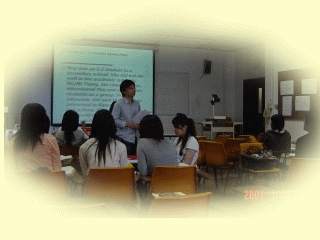Understanding & Guiding Whole-person Development

Home > Contents > Session Seven
Session Seven: Career
development
How might teachers enhance adolescents' career development?
- Understanding adolescentsˇ¦ career and talent development
- Helping adolescents understand their strengths and interests
- Helping adolescents understand people at work
- Career education activities in Hong Kong schools

Learning Outcomes
At end of the session, the participants will be able to:
1. Comprehend the nature of self-concept and its relationship to students' academic achievement and personal and social
development
2. Evaluate the factors that enhance or inhibit students' career and talent development
3. Suggest appropriate strategies to enhance students' confidence in applying life skills in career and talent development
4. List career education activities that help students understand their strengths and interests
5. Apply theories and give sufficient rationales for any intervention plan
6. Develop different skills (e.g. communication, helping, critical thinking and problem-solving skills) to tackle novel
situations and ill-defined problems
|
Task:
A student named Ken with Talent in Music (see
above)
Example: (The task below is just selected from those tasks assigned in the Learning Guides.)
Ken was an S.4 student in a secondary school with many high ability students. He studied Chinese, English, Maths, Physics,
Chemistry, Biology, A.Maths, and Music. During S.3 he started to play music and sing in a band. He won a distinction prize
in an inter-school singing competition. His academic results at S.3 were above average. However, at S.4 level he was not
attentive in class and his test results were poor. Ms/Mr Tsang, his class-teacher, interviewed Ken after the first academic term.
In the interview Ken revealed that he was not interested in Maths and Sciences but very interested in Music. He had a number
of friends involved in playing music. His elder sister was studying Economics in the University. His father was a computer
programmer and wanted Ken to be an engineer. His mother was a primary school teacher and was very supportive to Ken.
In future, Ken would like to work in the music business field. He wanted to change his study to Economics and Accounting. |
Please answer these questions as preparation:
In your own words, describe Kenˇ¦s situation. How would you feel if you were Ken? If you were Mr/ Ms Tsang, what would you
do in supporting Ken? What are the possible ways for Ms/Mr Tsang to help Ken and his classmates explore their career options
and develop their talents?
References (see above)
Further readings and resources:
Optional Web-based
Activities and Videos
Evaluating My Career Interests; How Assertive Will I Be in
Hunting for a Job?
http://www.mhhe.com/santrocka10
Career Guidance Section of the EDB
http://www.edb.gov.hk/index.aspx?langno=1&nodeid=235
Career Development and Guidance Worksheets
http://www.khake.com/page95.html
Matching Careers to Self-exploration-CDC Worksheets
http://www.uwm.edu/Dept/CDC/cdc_tools.html
Careers Advisory Service from Labour Department
http://www.careers.labour.gov.hk/2000/cas/web_gui/eng/main/index.htm
Movies
Bend it like Beckham (Available
in HKU Library)
AV 791.43 B458 DV
October sky [videorecording]
/ Universal Pictures presents; directed by Joe Johnston E 791.43 O21
Further Readings
- Gagne, F. (2003). Transforming
gifts into talents: The DMGT as a developmental theory. In
N. Colangelo, & G.A. Davis (eds.) Handbook of gifted education. (3rd ed.,
pp. 229-237).
Boston: Pearson.
- Feldhusen, J. F. (2003).
Talented youth at the secondary level. In N. Colangelo, & G. A.
Davis (Eds.), Handbook of gifted education. (pp.229-237). Boston, MA: Pearson.
- Herr, E. L., Crammer,
S. H., & Niles, S.G. (2004). Career guidance and counseling through
the lifespan: systematic approaches. 6th edition. Boston: Pearson. (Chapter
8 Career
development in the junior high/middle school)

![]()
